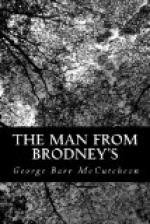Once a week the regular concert gave way to a function in which the royal orchestra was featured. On such occasions the attendance was extremely fashionable, the Duke and his court usually being present. It was not until this time, however, that Chase felt that he could sit through a concert without being bored to extinction. He loved music, but not the kind that the royal orchestra rendered; Wagner, Chopin, Mozart were all the same to him—he hated them fervently and he was not yet given to stratagems and spoils. He sat at a table with the French attache just below the box occupied by the Princess and her party. In spite of the fact that he was a gentleman, born and bred, he could not conquer countless impulses to look at the flower-face of the royal auditor. They were surreptitious and sidelong peeps, it is true, but they served him well. He caught her gaze bent upon him more than once, and he detected an interest in her look that pleased his vanity exceeding great.
Gradually the programme led up to the feature of the evening—the rendition of a great work under the direction of a famous leader, a special guest of the music-loving Duke.
Chase arose and cheered with the assemblage when the distinguished director made his appearance. Then he proceeded to forget the man and his genius—in fact everything save the rapt listener above him. She was leaning forward on the rail of the box, her chin in her hand, her eyes looking steadily ahead, enthralled by the music. Suddenly she turned and looked squarely into his eyes, as if impelled by the magnetism they unconsciously employed. A little flush mounted to her brow as she quickly resumed her former attitude. Chase cursed himself for a brainless lout.
The number came to an end and the crowd arose to cheer the bowing, smiling director. Chase cheered and shouted “bravo,” too, because she was applauding as eagerly as the others. She called the flushed, bowing director to her box, and publicly thanked him for the pleasure he had given. Chase saw him kiss her hand as he murmured his gratitude. For the first time in his life he coveted the occupation of an orchestra leader.
The director was a frail, rather good-looking young man, with piercing black eyes that seemed too bold in their scrutiny of the young lady’s face. Chase began to hate him; he was unreasonably thankful when he passed on to the box in which the Duke sat.
The third and last time he saw the Princess Genevra before his sudden, spectacular departure from the Grand Duchy, was at the Duke’s reception to the nobility of Rapp-Thorberg and to the representatives of such nations of the world as felt the necessity of having a man there in an official capacity.
CHAPTER IV
THE INDISCREET MR. CHASE
There was not a handsomer, more striking figure in the palace gardens on the night of the reception than Hollingsworth Chase, nor one whose poise proved that he knew the world quite as well as it is possible for any one man to know it. His was an unique figure, also, for he was easily distinguishable as the only American in the brilliant assemblage.




